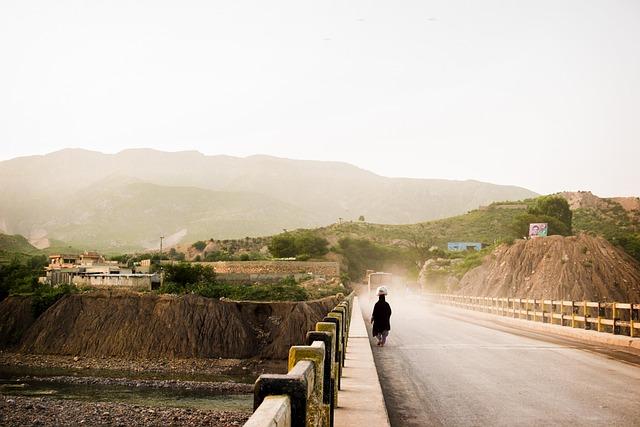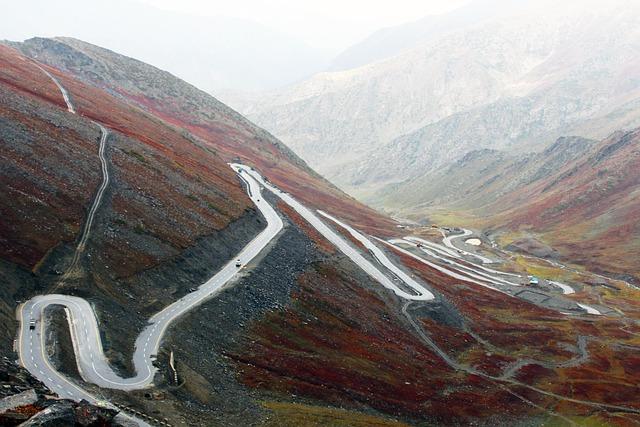In an ever-evolving global landscape, where nations are interconnected through complex webs of diplomacy, trade, and culture, Pakistan stands at a pivotal crossroads. With its rich history and strategic geographical position, the country is poised to play a significant role in shaping the future of international relations. From its engagements in regional alliances to its pursuits for peace and stability, Pakistan’s journey is not merely a narrative of challenges and conflicts; it is also a tale of resilience and potential. As we delve into the intricate dynamics of Pakistan’s foreign policy, we will explore how this nation is navigating the currents of global geopolitics, fostering partnerships, and carving out a voice that resonates on the world stage. Join us as we unpack the complexities and nuances of Pakistan’s role in crafting a collective future, one marked by cooperation, innovation, and a shared vision for a better tomorrow.
Shifting Paradigms: Analyzing Pakistans Strategic Position in Global Geopolitics
In recent years, there has been a noticeable evolution in Pakistan’s strategic outlook, reflecting a deeper understanding of its position within the international system. This transformation is underpinned by multi-dimensional diplomacy aimed at fostering alliances while navigating complex regional and global challenges. Key elements of this approach include:
- Emerging Economies Collaboration: Strengthening ties with countries in the Global South to promote trade and investment.
- Geopolitical Balancing: Maneuvering between major powers such as the US, China, and Russia to maximize national interests.
- Counter-Terrorism Initiatives: Enhancing cooperation with global partners to address security concerns and improve the country’s image.
Furthermore, the increasing importance of economic corridors and connectivity projects signifies Pakistan’s pivotal role in regional trade dynamics. Initiatives such as the China-Pakistan Economic Corridor (CPEC) exemplify how infrastructure development can serve as a leverage point in international negotiations, forging new alliances while boosting local economies. The strategic location of Pakistan, bordered by significant players and trade routes, positions it as a critical hub for international logistics, which is crucial for:
| Strategic Interests | Description |
|---|---|
| Energy Security | Facilitating energy imports from Central Asia and the Middle East. |
| Trade Access | Connecting landlocked Afghanistan and Central Asian markets to global trade networks. |
| Regional Stability | Promoting peace initiatives that can lead to economic prosperity in South Asia. |

Building Bridges: Strengthening Diplomatic Ties for Economic Development
In an era where global interconnectedness is more vital than ever, Pakistan’s commitment to enhancing its diplomatic relationships plays a crucial role in fostering economic development. By collaborating with nations across continents, Pakistan paves the way for mutually beneficial partnerships that leverage shared resources and expertise. These collaborations can lead to tangible benefits such as:
- Increased Trade Volumes: By negotiating favorable trade agreements, Pakistan can open its markets to foreign investments, enabling local industries to flourish.
- Technology Transfer: Engaging with countries with advanced technologies can bring innovation to Pakistani industries, enhancing productivity and efficiency.
- Cultural Exchange Programs: Strengthening people-to-people ties through educational and cultural collaborations can foster goodwill and understanding between nations.
Furthermore, robust diplomatic ties can unlock substantial financial aid and development grants which are essential for infrastructure projects across Pakistan. Through strategic partnerships, the nation can attract foreign direct investment (FDI) that invigorates the local economy and creates job opportunities. Countries that have already established strong diplomatic networks with Pakistan include:
| Country | Type of Partnership | Key Economic Benefits |
|---|---|---|
| China | Bilateral Trade Agreement | Infrastructure development via CPEC |
| United Arab Emirates | Investment Partnerships | Real estate and tourism growth |
| United States | Economic Aid Programs | Support for education and healthcare sectors |

Empowering Voices: Pakistans Engagement in Multilateral Organizations
Pakistan’s proactive stance in various multilateral organizations showcases its commitment to global cooperation and sustainable development. By participating actively in platforms such as the United Nations, the Organization of Islamic Cooperation (OIC), and the South Asian Association for Regional Cooperation (SAARC), the country not only amplifies its voice on critical issues but also strengthens its diplomatic relations. Through these engagements, Pakistan has been able to address key global challenges, including poverty alleviation, climate change, and terrorism, demonstrating its pivotal role in fostering international dialogue and collaboration.
Moreover, Pakistan’s involvement in multilateral forums often emphasizes its strategic partnerships and collaborative efforts in the realm of peacekeeping and conflict resolution. For instance, the country contributes significantly to UN peacekeeping missions around the globe, embodying its dedication to international stability. By advocating for inclusive policies and sustainable solutions, Pakistan not only serves its national interests but also aligns with broader global objectives aimed at creating a secure and prosperous world. Key areas of focus include:
- Gender equality: Promoting women’s rights and participation in peace processes.
- Climate action: Initiating measures for environmental sustainability and disaster resilience.
- Humanitarian assistance: Providing aid and support in times of crisis.

Innovating Solutions: Leveraging Technology for Enhanced Global Cooperation
In an era where technology rapidly transforms the landscape of diplomacy and international relations, the ability to harness digital tools for global cooperation is paramount. Countries like Pakistan are increasingly utilizing artificial intelligence, data analytics, and blockchain technology to enhance transparency and efficiency in diplomatic engagements. Through real-time data sharing, nations can jointly tackle transnational issues such as climate change, terrorism, and economic instability. Pakistan’s strategic geographic location offers unique opportunities for leveraging these technologies, promoting a collaborative approach with neighboring countries and international partners.
Moreover, the burgeoning tech landscape in Pakistan fosters innovation hubs that contribute to the global conversation on international relations. By supporting startups focused on sustainable solutions and digital diplomacy, Pakistan can act as a catalyst for creative solutions that address global challenges. These initiatives not only strengthen bilateral relations but also position the nation as a key player in shaping international norms. The emphasis on technology-driven initiatives could lead to enhanced disaster management protocols, improved resource sharing, and optimized trade relationships, ultimately paving the way for a more united global community.
In Retrospect
As we draw the curtain on our exploration of “Shaping Futures: Pakistan’s Role in Global International Relations,” it becomes clear that Pakistan stands at a unique crossroads, poised to navigate the complex web of international dynamics with both historical legacy and contemporary ambition. The nation’s rich tapestry of culture, resilience, and strategic importance not only enhances its global stature but also underscores its capacity to influence regional and international dialogues.
In a world where alliances are ever-evolving and challenges are emergent, Pakistan’s engagement on the global stage will demand not only adept diplomacy but also innovative approaches to foster cooperation and understanding. Whether addressing pressing issues like climate change, economic disparity, or security concerns, Pakistan has the potential to be a key player in crafting solutions that benefit not just its own populace but humanity at large.
As we look ahead, the narrative of Pakistan in international relations reminds us that every nation has a role to play in shaping a more equitable and sustainable future. The opportunities are vast, the challenges are real, and the road ahead is one that must be navigated with vision, determination, and an unwavering commitment to global citizenship. In this ever-changing landscape, the hopes of tomorrow are inextricably linked to the actions taken today—an open invitation for Pakistan to step boldly onto the world stage and leave an indelible mark on the fabric of international relations.



